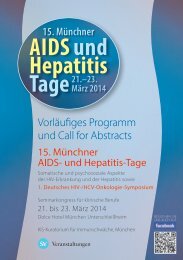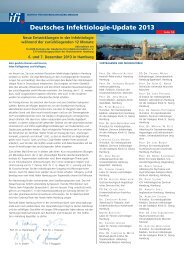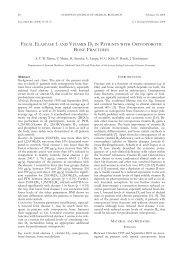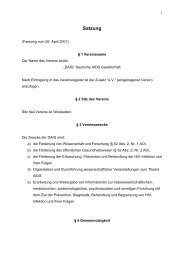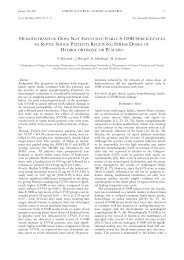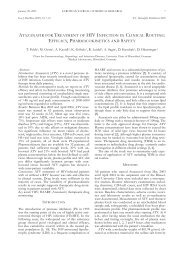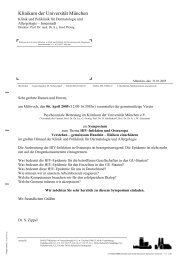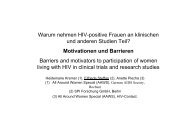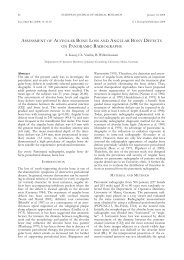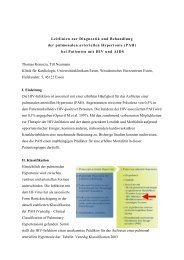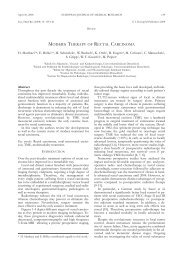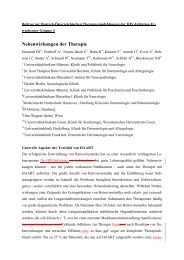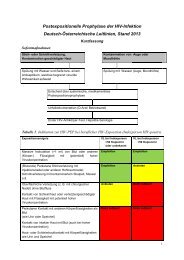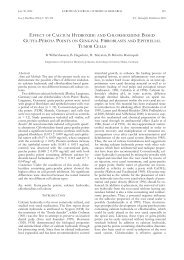European Journal of Medical Research - Deutsche AIDS ...
European Journal of Medical Research - Deutsche AIDS ...
European Journal of Medical Research - Deutsche AIDS ...
Create successful ePaper yourself
Turn your PDF publications into a flip-book with our unique Google optimized e-Paper software.
June 27, 2007 EUROPEAN JOURNAL OF MEDICAL RESEARCH<br />
43<br />
HIV-Kohorte muench01 Gesamtbevölkerung Deutschland<br />
Männer (%) Frauen(%) Männer (%) Frauen(%)<br />
Arbeitslosenquote 9 18 12 10<br />
Vollzeit beschäftigt 85 47 95 69<br />
Teilzeitbeschäftigt 15 53 5 31<br />
ohne<br />
Schulabschluss<br />
ohne<br />
Berufsabschluss<br />
2 12 10 16<br />
7 29 n. a. n. a.<br />
Männer (%) Frauen(%)<br />
Trotz schlechteren Bildungsniveaus der schwarzen und asiatischen<br />
Frauen sind diese mit 54% in gleichem Maße berufstätig<br />
wie die kaukasischen Frauen mit 56% (Tabelle 1).<br />
Schlussfolgerungen: Die Arbeitslosenquote in unserer HIV-<br />
Kohorte entspricht in etwa der gesamtdeutschen Arbeitslosenquote.<br />
Die berufstätigen HIV-Patienten arbeiten häufiger<br />
Teilzeit im Vergleich zur deutschen Gesamtbevölkerung. Das<br />
Bildungsniveau der in der Kohorte erfassten schwarzen und<br />
asiatischen Frauen ist wesentlich niedriger als das der<br />
Kaukasierinnen; der Anteil der berufstätigen Frauen unterscheidet<br />
sich jedoch nicht nach Ethnizität.<br />
A.46 (Poster)<br />
Migration and prostitution – not a topic in the<br />
HIV/<strong>AIDS</strong> discourse?<br />
Steffan E. 1 , Sokolowski S. 1<br />
1 SPI Forschung gGmbH, Berlin, Germany<br />
Background: The share <strong>of</strong> migrants among the sex workers<br />
in Germany has increased from 30% in the 90ies up to 70-<br />
80% to date. The legal framework regarding this particular<br />
group has also become a subject <strong>of</strong> change meanwhile. The<br />
law for protection <strong>of</strong> infectious diseases, the prostitution law<br />
and not least the EU Eastern-Enlargement have a massive impact<br />
on the living conditions <strong>of</strong> the sex workers with migration<br />
background as well as on their accessibility for prevention<br />
and health care <strong>of</strong>fers. Both laws are currently in process<br />
<strong>of</strong> amendment, which encourages a stronger focus on the HIV<br />
and STI prevention aspects for this particular group to be additionally<br />
undertaken.<br />
Method: Our thesis is based on the achievements and outcomes<br />
<strong>of</strong> several <strong>of</strong> our own studies. A total number <strong>of</strong> 157<br />
sex workers (including 28 males) with migration background<br />
were interviewed in the frame <strong>of</strong> the projects “Migration and<br />
HIV” (2004) and “BORDERNET” (2006). We tackled the issue<br />
<strong>of</strong> the change in the <strong>AIDS</strong> and STI counselling centres in<br />
the study “Health care services in transition” (2003) and “The<br />
reorganisation <strong>of</strong> the <strong>AIDS</strong>/STD counselling centres in North-<br />
Rhein–Westphalia” (2006)<br />
Results: According to our data the migrant sex workers are<br />
relatively <strong>of</strong>ten affected by STIs, whereas Gonorrhoea and<br />
Chlamydia trachomatis represent the most <strong>of</strong>ten diagnosed<br />
STIs in the group. Around 65% <strong>of</strong> the respondents have a<br />
good basic knowledge <strong>of</strong> HIV/<strong>AIDS</strong> and STIs infection and<br />
prevention but myths and fears are widely spread among the<br />
Frauenohne<br />
Schulabschluss (%)<br />
Kaukasisch 91 57 1 15<br />
Frauenohne<br />
Berufsabschluss<br />
(%)<br />
Schwarz 4 29 19 43<br />
Asiatisch 1 8 24 70 Tabelle 1.<br />
group. More than 75% <strong>of</strong> the interviewees reported that every<br />
5th to every 2nd client <strong>of</strong>fers to pay more for unsafe sex or refuses<br />
condom use. The lacking or insufficient adjustment <strong>of</strong><br />
the public health care <strong>of</strong>fers to the new legal and political<br />
framework deteriorates the access to the STI counselling services<br />
by the migrant sex workers.<br />
Discussion: Sex workers with migrant background should<br />
rely on voluntary and anonymous health care services. The<br />
latter can achieve only a certain coverage given that the services<br />
have to adapt to the new legislative conditions in the<br />
prostitution milieu. Besides the establishment <strong>of</strong> outreach services,<br />
further <strong>of</strong>fers have to be developed, which assure accessible<br />
thresholds to the available health services for the sex<br />
workers.<br />
A.47 (Vortrag)<br />
Transcultural intermediary training HIV/<strong>AIDS</strong>:<br />
A key-model for intercultural education<br />
Kimil A. 1 , Wienold M. 1 , Salman R. 2<br />
1 Ethno-Medizinisches Zentrum, MAP-Team, Hannover,<br />
Germany, 2 Ethno-Medizinisches Zentrum, Hannover,<br />
Germany<br />
Question: Intermediary Training HIV/<strong>AIDS</strong> is a structured<br />
training program developed by the Migrant-<strong>AIDS</strong>-Project in<br />
Hannover to bridge the knowledge gap between the native<br />
German and the immigrant population. The training also aims<br />
to stimulate solidarity in response to a perceived lack <strong>of</strong> support<br />
<strong>of</strong> migrants with HIV/<strong>AIDS</strong> in their own communities.<br />
Has this approach been successful?<br />
Methods: Qualitative and quantitative data from five training<br />
courses (each 50 hrs, 2002-2006) and from the intermediaries’<br />
campaigns (2006) were systematically evaluated. Feedback<br />
was also sought from public and private funders.<br />
Results: Over 100 intermediaries have participated in the project<br />
since 2002 in Hannover and Hamburg. The trainings have<br />
been highly appreciated by participants. Intermediaries have<br />
become involved in (self-) evaluation and in continued education<br />
(voluntarily). More than 200 group sessions were conducted<br />
in community settings. Data confirm earlier findings<br />
<strong>of</strong> deficits in specific sub-populations and groups. They also<br />
point to a high potential for discrimination and confirm a<br />
great distance to people with HIV. The increasing depth <strong>of</strong><br />
evaluation now brings forward detailed information on<br />
knowledge, behaviours and attitudes. Data from Hamburg



